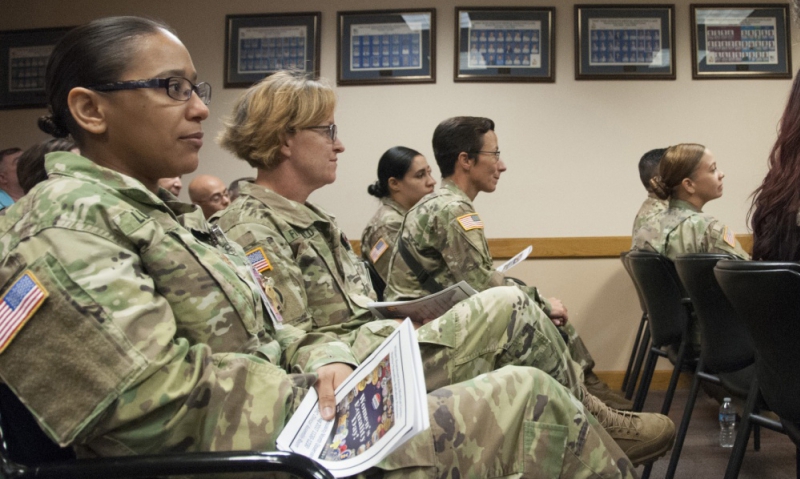
Women veterans who want to become heavy equipment operators can use the Post-9/11 GI Bill to enroll at the academy in Brentwood, N.H.
The total population of women veterans is expected to increase at an average rate of about 18,000 women per year for the next 10 years, according to a recent report from the U.S. Department of Veterans Affairs.
Although women have proudly served their country and made significant contributions, many of them feel like their military service goes unrecognized because of their gender. Women also experience more challenges when it comes to their needs upon transitioning into civilian life.
In a blog post at Task and Purpose, written by former active-duty Navy Officer Andrea Goldstein, she asserts that women veterans “do not want to be treated as if they are the same as male veterans, but rather have their specific experiences equally considered. But because women veterans have had a different experience than their male peers while wearing the uniform, this also affects their lives after military service.”
JoAnn Fisher agrees that post-military life for women is difficult because they aren’t given adequate tools and resources. However, she opposes the idea that women veterans in today’s society have to perform at higher standards just to get the same recognition as their male counterparts.
“When it comes to women, women do not self-identify (as a veteran). So when they die, nobody knows that they ever served,” said Fisher, a member of American Legion Randolph Furey Post 170 in Indian Head, Md., who served on active duty in the Navy reserves for 15 years. “There are more men who get honors when they die but fewer women. And their families don’t know because they don’t talk about it. We have to do more to make sure our women are recognized.”
As the founder and CEO of Women Veterans United Committee, Inc., Fisher’s motto is "women veterans invisible no more." She said her goal is to reach out to more women veterans and improve their quality of life by helping them obtain more opportunities in the workforce.
“I don’t feel like we’re given enough credit. I feel like we’re not recognized enough,” the former Maryland Joint Veterans Committee chairwoman said. “People will say, ‘Yeah ok, you’re a woman veteran. Good for you.’ But they’ll (disregard) a woman veteran and recognize a man, who could be a lower rank with less honors and medals, before they do her.
“That’s not giving us the respect that we deserve. We are intelligent. We have the capabilities and leadership skills to do all kinds of things. But women are not recognized in that way – that’s the issue that I see.”
In an effort to prove naysayers wrong, Fisher is seeking 10 women veterans who want to become heavy equipment operators and enroll at the Heavy Construction Academy (HCA) in Brentwood, N.H.
“We want to send 10 women up there using the Post-9/11 GI Bill,” she said. “The school itself will be doing all of the interviewing. They know the right questions to ask to get an idea about who’s sincere and serious. The school will take anybody but for women veterans, they want them to use their GI Bill benefits.”
HCA’s six-week training program provides students with real world skills, knowledge and certification necessary to succeed in the construction industry. The curriculum consists of classroom instruction, field demonstrations and other hands-on activities best suited for current economic states, weather conditions and industry demand, according to the academy’s website.
No experience with heavy equipment is necessary. Upon completion of HCA’s program, students will be certified to operate nine different pieces of heavy equipment: a front-end loader, skid steer, backhoe, off-road dump truck, vibratory compact roller, bulldozer, motor grader, excavator and rough terrain telescoping forklift.
“A lot of organizations now are saying that they can’t find women. But the truth is that they’re not looking hard enough,” Fisher said. “There are women veterans out there and all you have to do is just begin to ask. But you won’t get them overnight.”
For Fisher, it’s important for women veterans to view themselves on the same playing field as their male counterparts.
“I grew up during the women’s movement,” she said. “With my children, I raised my (two) daughters accordingly so that they could do anything they wanted to. Women can do this; it’s not even a question.”
By taking on levels of authority and responsibility that few get to experience, Fisher is optimistic that HCA will dampen the stigma regarding gender bias and encourage more women to display confidence in their abilities.
“Heavy construction equipment is different from the typical office job. This is really about sending women into a hardcore men’s environment,” Fisher said. “We can do anything. It’s just something that someone has to take it upon themselves and say, ‘Let me mentor and help you get there.’”
Fisher said the Legion has opened the door for gender equality within the civilian community by recently selecting its first female national commander whose primary focus is ‘Family First.’ Negative perceptions about women veterans will fade away as traditional gender roles become a thing of the past.
“I have found that The American Legion is extremely sensitive about women issues. When I look around and see other women in key leadership positions, that’s what it is about and that’s what I like,” Fisher said. “Family first – we have to strengthen our women veterans by supporting and strengthening their families. That’s very powerful.”
All women veterans interested in applying for HCA’s program are encouraged to do so here.
For more information about how to participate in upcoming activities with Women Veterans United Committee, Inc., call (240) 305-5516.
- Careers

